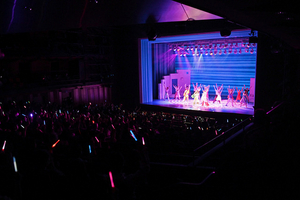BWW Exclusive: How MAMMA MIA! Is Bringing Theatre Back to Japan
Here we go again!

The dancing queens are having the time of their lives again in Japan. As BroadwayWorld previously reported, MAMMA MIA! opened on July 14 at the Kanagawa Arts Center in Yokohama, making it the very first production of the show to return in the world. The Dynamos are back, but with stringent new safety measures in place to make the theatres safe and protect the audience, actors, musicians and crew.
Since the start of the pandemic, Japan reported just over 30K confirmed cases (only 2.3K in Kanagawa), compared to almost 17M worldwide (as of July 28). BroadwayWorld checked in with Shiki Theatre Company, who presents the musical in Japan, to find out how they are working to keep both actors and audiences safe as the show goes on and how other theatres around the world can learn from their approach.
In terms of planning to continue performances, did you take the lead from any other theatres' attempts at reopening?
The organizations running business in the performing arts in Japan have gathered to form the Japan Performing Arts Solidarity Network (http://www.jpasn.net/), an organization aimed to respond to the coronavirus crisis. Taking in opinions from experts, key intellectuals, and individuals from the Japanese government, various discussions were held here regarding the preparations and preventive measures against the infection which would be required for resuming performances.
Based on scientific evidence of infection control, consideration was given to a wide variety of topics, including the state and the spread of respiratory droplets and the preventive measures thereof, the degree of necessity of air ventilation, etc. Shiki Theatre Company's productions were reopened in accordance with the guidelines which this organization is in the act of establishing. We believe the contents of the guidelines allow for the realization of theatrical productions at theatres while keeping the risk of the spread of infection to a minimum.
What kind of response have you gotten from the community in regards to beginning performances again?
It is true that there are those among the Japanese society who consider theatres as closed space, and hesitate to come for fear of infection. However, there are also many of those who feel they had been robbed of opportunities to expose themselves to performing arts, due to the closure of performances spanning almost five months, and that they are missing enrichment in their lives. These two groups will continue to coexist for a while. We believe that all we can do is to ensure that we sufficiently take preventive measures against the infection at our theatres, endeavor to foster the audiences' sense of reassurance, continue our work even in spite of the restriction on capacity, and continue our efforts so that the people in the latter group may increase.
How are you handling backstage safety/testing for actors?
We require our performers to conduct temperature checks every day, and those on the producing side are monitoring them properly. We have also prepared a system where the actors are able to easily self-report online if they feel even the slightest abnormal change in their physical condition. They are taking health and sanitary control measures, including wearing a mask at all times when they are not performing, thoroughly disinfecting their hands (carrying a spray bottle), and frequently ventilating their dressing rooms. We are conducting PCR tests regularly for the performing actors, and only cast those who have tested negative.
At the theatres, we have made a complete separation between the area with high risk of infection due to traffic of unspecified individuals, including the audience members, and the protected area where only the performers and staff come and go; we try to avoid traffic between those two areas as much as possible.
What is the protocol if someone from the company becomes ill?
We have an organized group which analyzes and makes judgments on the self-reports from the actors regarding their physical condition. We have multiple cast candidates for every role/track, and therefore have a prepared structure which enables cast changes as deemed necessary by the judgment of this organization. In the event that someone in the cast is found to be infected by the coronavirus, we have a protocol prepared to immediately suspend the show, make an announcement to the audiences, and refund tickets.
Have you found that audience members have been happy to comply with new safety standards?
The preventive measures against the infection are there in order to protect the health of our audience members, first and foremost. We are forcing them slight inconveniences in an environment that is different than that of the usual theatres, but most of the guests coming to our theatres understand properly that this would lead to their own benefit. The fact that the performing arts in Japan was able to revive at an early stage amid this coronavirus crisis is extremely owing to such understanding and cooperation from the audience members.
Since premiering in London in 1999, the irresistible feelgood musical has captured the hearts of millions around the globe. The sunny, funny tale of a mother, a daughter and three possible dads on a Greek island idyll, all unfolding to the magic of ABBA's timeless pop masterpieces, has now been seen live on stage by 65 million people across the world and turned into two record-breaking movies - MAMMA MIA! The Movie and MAMMA MIA! Here We Go Again.
With music & lyrics by Benny Andersson & Björn Ulvaeus, MAMMA MIA! is written by Catherine Johnson, directed by Phyllida Lloyd and choreographed by Anthony Van Laast. The production is designed by Mark Thompson, with lighting design by Howard Harrison, sound design by Andrew Bruce & Bobby Aitken, and musical supervision, additional material & arrangements by Martin Koch.
Videos


